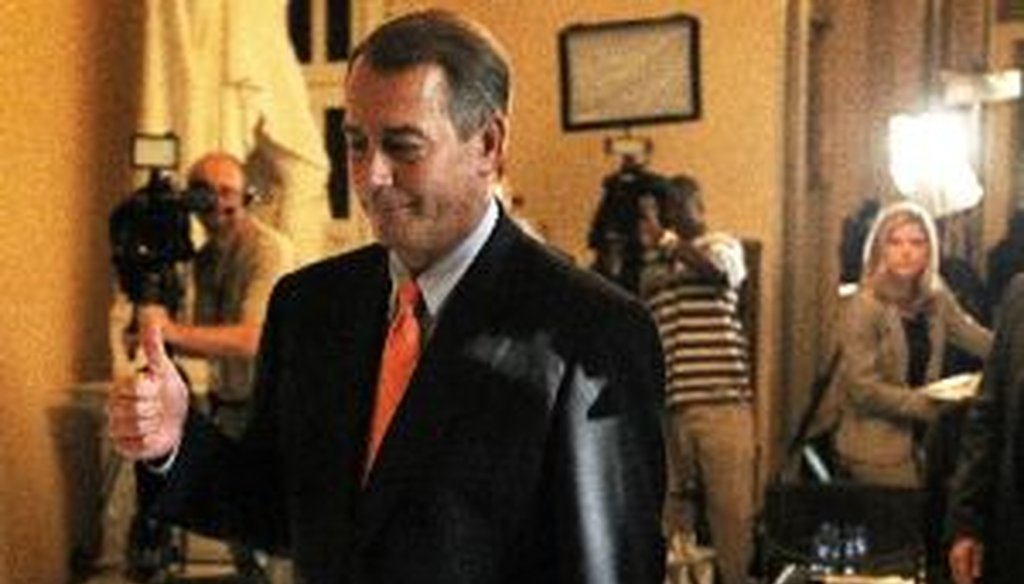Stand up for the facts!
Our only agenda is to publish the truth so you can be an informed participant in democracy.
We need your help.
I would like to contribute

House Speaker John Boehner, R-Ohio, gives a thumbs up as he passes reporters in the Capitol after a key debt-ceiling vote on July 29, 2011.
As the debt-ceiling debate slouches towards the finish line, we thought we’d offer readers a collection of links to our recent coverage of the debate.
As might be expected, both PolitiFact’s national staff and its nine state affiliates have delved into the subject. Here are some of our recent items.
• As the debt-ceiling crisis deepened, U.S. Sen. Ron Johnson, R-Wisconsin, lambasted Democrats for failing to put together a public plan to bring down federal spending. Johnson, in an appearance on CNBC’s "Squawk Box," argued that constitutional limits on government spending were the only way to keep politicians’ hands off the pocketbooks of their constituents.
"We’ll increase the debt ceiling, give the president what he wants, and all we’re saying is, ‘Let’s pass a constitutional limitation to the size of government,’ which by the way is the root cause of the problem," Johnson said. "The federal government is spending 25 percent of our entire economy versus 100 years ago, we spent only 2 percent. The problem is the size, the scope, all the regulations and the cost of government."
PolitiFact Wisconsin rated this claim True.
• On July 27, 2011, Rep. Allen West, R-Fla., appeared on CNN and said, "This is the first time in the history that we've had the raising of a debt limit also with spending cuts.
PolitiFact Florida rated this claim False.
• In a recent television interview, House Majority Leader Eric Cantor, R-Va., boldly predicted that Republicans in his chamber would unite to pass Speaker John Boehner’s plan to lift the nation’s debt ceiling.
Cantor dismissed as "unacceptable" the option of not increasing the $14.3 trillion debt limit by Aug. 2, when the nation will start running short of funds to pay its obligations. He was scornful of a proposal by Sen. Majority Leader Harry Reid, D-Nev., to raise the debt limit.
"Harry Reid’s plan is basically giving the president a blank check, giving him what he wants, a blind increase of the debt ceiling to spend the money the way he wants," Cantor said during a July 26 interview on Fox News.
PolitiFact Virginia rated the claim False.
• Josh Mandel, who was elected Ohio treasurer last November, is considered a potential candidate for U.S. Senate. The Ohio Democratic Party issued a statement saying that Mandel "supports allowing the United States to default on its obligations." The statement said the "extreme stand" puts him in disagreement with Ohio Republicans like Sen. Rob Portman and U.S. House Speaker John Boehner.
PolitiFact Ohio rated that claim Pants on Fire.
• On the July 24, 2011, edition of NBC’s Meet the Press, Sen. Tom Coburn, R-Okla., sought to give some perspective on the size of federal spending. Addressing host David Gregory, Coburn said, "David, everybody's talking about the symptoms of our problem instead of the real disease. The government's twice the size it was 10 years ago. It's 30 percent bigger than it was when (Barack) Obama became president. The problem is that we're spending way too much money, and it's not hard to cut it without hurting entitlement benefits. But we don't have anybody that wants to do that without getting a tax increase."
PolitiFact national rated this claim Mostly True.
• Sen. Rob Portman, R-Ohio, said that "if you look back, historically, you know usually the debt limit is for less than a year," he added. "Thirty-four of the last 44 (debt hikes) have been for less than a year. So, this notion that short-term is somehow the exception, it's actually the rule."
PolitiFact Ohio rated this claim True.
Our Sources
See original Truth-O-Meter items.






































